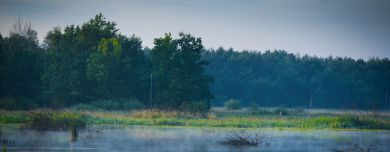The project 'Counteracting the decline of pollinating insects' began with the purchase of 30 new beehives, which were placed in the apiary of Master Beekeeper - Janusz Kłys. The hives were painted (impregnated) with woodchip against external weather conditions. Into the finished hives, the 'nucs' - young bee colonies - were transferred.
As part of the project, many educational activities were carried out for both children and adults. The first to be organised was a class for farmers, held in March 2016 at the District Association of Farmers, Wheels and Agricultural Organisations. The topic of the meeting was 'Use of chemicals in agriculture negatively affecting bee health and viability'. a total of more than 40 farmers participated in the session.
This was followed by educational classes for kindergarten children. The class lasted approximately 1.5 hours. The children learned what a bee looks like, where it lives and what it likes to do most. They saw what a beehive looks like inside. They had the opportunity to touch the frame, the bilge, smell what real wax smells like and see a real beeswax candle. They made a beeswax candle with their own hands. Mr Janusz told some interesting stories about the life of the apiary. He showed beekeeping equipment and lit up a hoover.At the end of the class, a sweet treat was served in the form of waffles with honey. Water with honey was served for drinking . At the end of the activity a souvenir photo was taken with the beekeepers' hats on.
The class started by learning about the heroes of the day. How a bee is built, where it lives and what it does.
There was honey for the preschoolers to taste and beeswax to make their own candles.
The preschoolers observe how honey is made.
Special preparations for the meeting with the bees.
The next guests visited Mr Janusz's apiary, this time the students of class 2A of LO I in Łomża
The aim of the classes was to raise awareness among young people of the essence of life in symbiosis between humans and bees, to improve the existence of bee colonies, and to show what a great example it is to combine the traditional method of keeping bees with learning and observing the life of these fascinating insects in their natural environment.
The workshop was divided into two stages. The first was theoretical. Young people were able to see a demonstration beehive, learn how it is built, how a bee colony functions, what it needs to survive, what threats await bees, and how modern economy and civilisation affect their proper development and functioning.
The second part - the practical part - required proper preparation. The pupils were given protective suits. The class was divided into several smaller groups so that they could observe the bees at work in peace and quiet. With the hive open, the beekeeper talked about the life of the bees, showed frames with brood at different stages of development, and displayed frames with sealed honey. The main task was to find the queen (queen bee) in each of the hives viewed and this was accomplished. The pupils also had the opportunity to look inside the workshop, where they learned how honey from the frame goes into the jar ready to be eaten.
At the end of the workshop there was a 'honey' treat, i.e. spicy gingerbread with honey and water with honey, mint and lemon - perfect for drinking on a hot day.
I would like to express my sincere thanks to the management of the General Secondary School Complex in Łomża, and the biology teachers Ms Anna Skibińska and Ms Ewa Urbańska for their help with the task.
.jpg)
